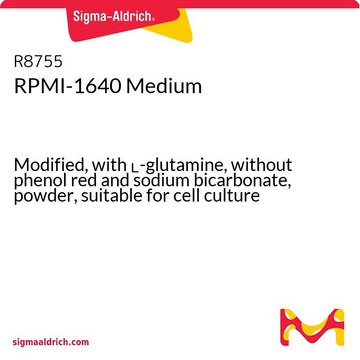R7638
RPMI-1640 Medium
Dutch Modification, with sodium bicarbonate and HEPES, without ʟ-glutamine, liquid, sterile-filtered, suitable for cell culture
Synonym(s):
Roswell Park Memorial Institute 1640 medium
About This Item
Recommended Products
Product Name
RPMI-1640 Medium, Dutch Modification, with sodium bicarbonate and 20mM HEPES, without L-glutamine, liquid, sterile-filtered, suitable for cell culture
Quality Level
sterility
sterile-filtered
form
liquid
technique(s)
cell culture | mammalian: suitable
impurities
endotoxin, tested
pH
>7.2
components
sodium pyruvate: no
HEPES: 20 mM
L-glutamine: no
NaHCO3: yes
phenol red: yes
shipped in
ambient
storage temp.
2-8°C
Looking for similar products? Visit Product Comparison Guide
General description
Application
- to obtain spleen and lymph nodes from mice
- for the resuspension of Staphylococcus aureus strains in the phagocytosis assay
- in the isolation of hepatitis B surface antigen-specific B-cell clones
Reconstitution
also commonly purchased with this product
Storage Class
12 - Non Combustible Liquids
wgk_germany
WGK 1
flash_point_f
Not applicable
flash_point_c
Not applicable
Choose from one of the most recent versions:
Already Own This Product?
Find documentation for the products that you have recently purchased in the Document Library.
Customers Also Viewed
Our team of scientists has experience in all areas of research including Life Science, Material Science, Chemical Synthesis, Chromatography, Analytical and many others.
Contact Technical Service






